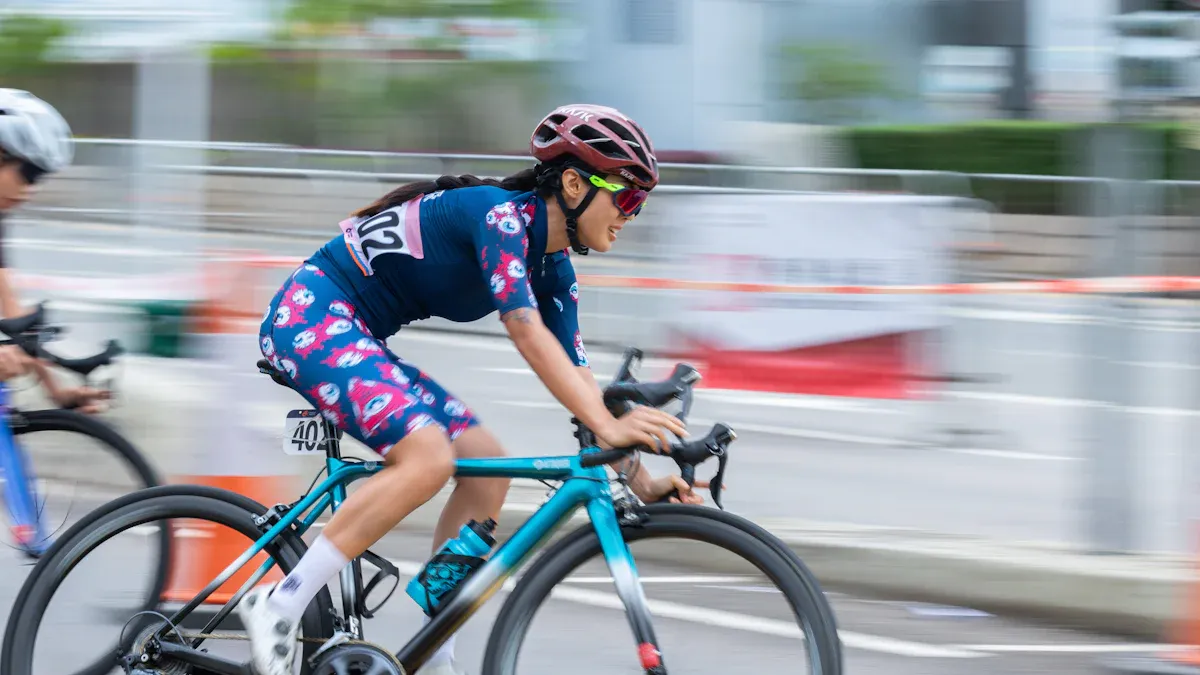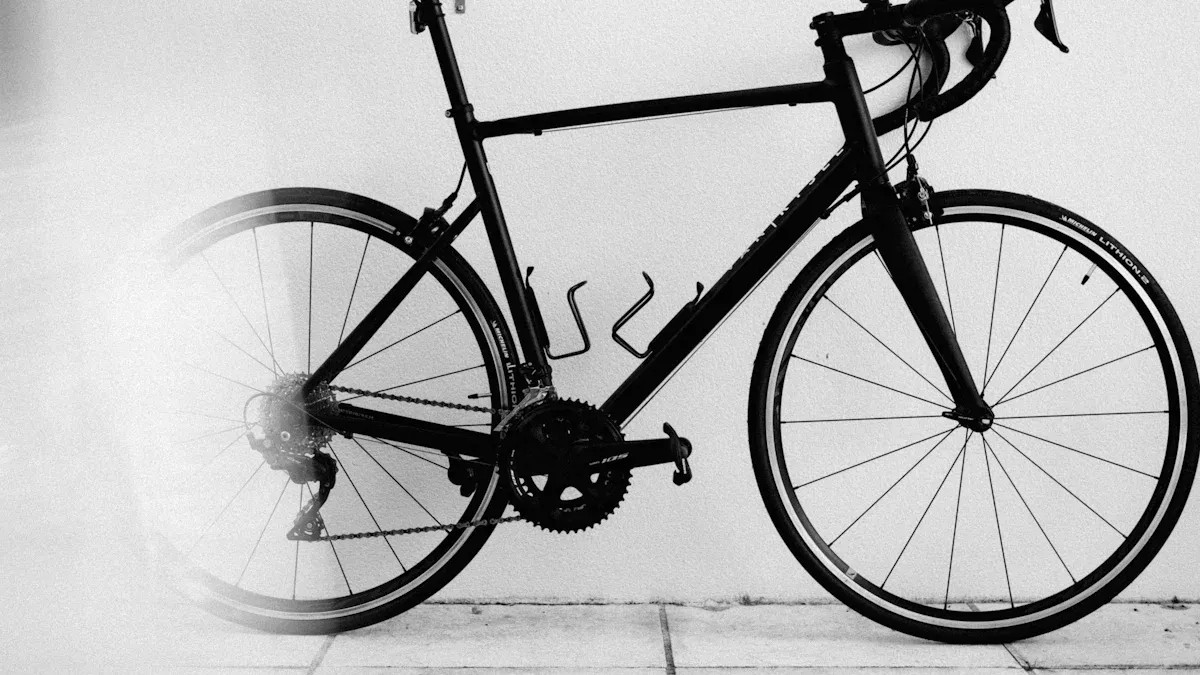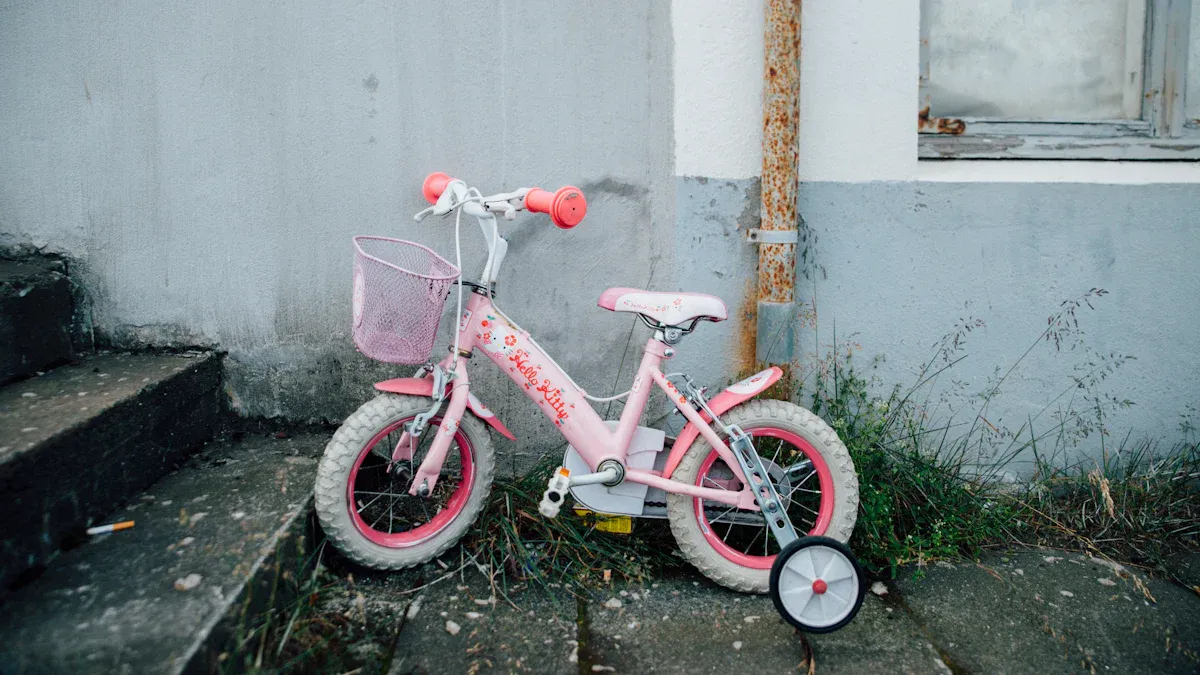
Understanding how girl vs boy bike frames are different is important for your riding experience. These differences affect comfort and performance significantly. For example, a good frame helps you get on and off the bike easily. It also improves your control and handling when riding. Picking the right bike frame based on these factors ensures you have a smoother and more enjoyable ride.
Key Takeaways
Girl bike frames have a shorter reach and sloping top tube, making it easier for girls to mount and dismount.
Choosing the right bike size is crucial. Ensure your child can touch the ground while sitting for safety and comfort.
Wider saddles on girls’ bikes provide better comfort, while boys’ bikes often have stiffer frames for performance.
Always let your child test different bike sizes to find the best fit for their height and inseam.
Focus on comfort and usability when selecting a bike, regardless of gender labels.
Frame Geometry

When you look at bike frames, the shape is very important. It affects how comfy and easy your ride will be. The differences in design between girl and boy bike frames are big. Knowing these differences helps you pick the right bike for you.
Girl vs Boy Bike Frame Design
The design of girl and boy bike frames has some key differences. Here’s a list of the main differences:
Feature | Girl Bike Frames | Boy Bike Frames |
|---|---|---|
Shorter reach, sloping top tube | Longer reach, straight top tube | |
Handlebar Width | Narrower handlebars | Wider handlebars |
Saddle Width | Wider saddles for wider hips | Narrower saddles |
Frame Sizes | Smaller frame sizes | Larger frame sizes |
These design choices fit the body differences between girls and boys. For example, girls often have longer legs and shorter torsos. This means a shorter top tube on girls’ bikes makes it easier to reach. Also, narrower handlebars on girls’ bikes fit their shoulders better.
Mounting and Dismounting Ease
Getting on and off a bike can be hard, especially for younger riders. Girl bike frames usually have a step-through design. This design makes it easier to get on and off the bike. It is helpful in cities or for those wearing skirts.
Here are some good things about this design:
A lower standover height helps you get on the bike.
The frame shape fits different body types, making it more comfy.
This design is great for city riding with stops.
On the other hand, boy bike frames often have a higher top tube. This design can make it harder to get on and off, especially for younger riders who may have balance issues.
By knowing these frame shape differences, you can choose a bike better. Comfort and usability should always be your main focus, no matter the gender labels.
Size Variations

When selecting a bike for your child, size plays a crucial role in ensuring safety and comfort. Understanding kid bike sizing can help you make the right choice. Here are some important considerations to keep in mind:
Kid Bike Sizing Considerations
Age and Height: Your child’s age and height are the primary factors in determining the right bike size. As children grow, their inseam length changes, which affects how they fit on a bike.
Proper Fit: A bike that is too big can be dangerous. Your child should be able to place the balls of their feet on the ground when sitting on the seat. This ensures they can stop safely and maintain balance.
Standover Height: When your child straddles the bike, there should be about a 1-inch clearance between the center bar and their crotch. This helps prevent injuries during mounting and dismounting.
Handlebar Reach: Ensure your child can comfortably reach the handlebars. If they have to stretch too far, it can lead to discomfort and poor control.
Tip: Always take your child with you when shopping for a bike. Let them try out different sizes to find the best fit.
Kids Bike Size Chart Overview
To help you choose the right bike size, here’s a simple kids bike size chart based on wheel diameter:
Bike Size | Inseam (inches) | Age Range |
|---|---|---|
12″ | 14-17 | 1-4 |
14″ | 16-20 | 2-5 |
16″ | 18-22 | 3-7 |
18″ | 20-24 | 5-9 |
20″ | 22-25 | 7-13 |
24″ | 24-28 | 10-15 |
Kids’ bikes are sized by wheel diameter rather than frame size. This means that common sizes include 12, 16, 20, and 24 inches. While selecting a bike, remember that marketing differences exist between girls’ and boys’ bikes, primarily in color and design. However, the physical needs for sizing remain similar across genders.
As you consider bike sizing, remember that modern designs prioritize ergonomic needs based on age and inseam rather than strictly on gender. This approach ensures that both boys and girls can find a bike that fits them well, enhancing their riding experience.
Material Choices
When you pick a bike, the frame materials matter a lot. They can change how well the bike works and how comfy it feels. Different materials have their own pros and cons. Let’s look at the common materials for girls’ and boys’ bike frames.
Common Materials for Girls’ Bikes
Girls’ bikes usually use materials that balance weight, strength, and cost. Here’s a quick summary of the most common materials:
Material | Advantages | Disadvantages |
|---|---|---|
Steel | Heavier, rusts more easily | |
Aluminum | Light, stiff, and not too expensive | Might not last as long |
Steel frames are strong and give a comfy ride. But they can be heavy for younger riders. Aluminum frames are lighter and easier to control, which is why many girls’ bikes use them.
Common Materials for Boys’ Bikes
Boys’ bikes often use a wider variety of materials, each with its own benefits. Here’s a breakdown:
Material | Pros | Cons |
|---|---|---|
Steel | Heavier than other types | |
Aluminum | Light, stiff, works well, doesn’t rust, and affordable | Can be less comfy |
Carbon Fiber | Very light, great stiffness-to-weight ratio, absorbs bumps | Expensive, not as strong |
Titanium | Light, very strong, doesn’t rust | Very pricey |
Steel frames are tough and comfortable. Aluminum frames are liked for being light. Carbon fiber frames perform really well but cost more. Titanium frames are strong and resist rust, but they can be very expensive.
Choosing the right material for your bike frame can improve your ride. Think about what you need and like when picking a bike. The right frame can really change your experience.
Ride Comfort and Handling
When you think about ride comfort and handling, girl and boy bike frames have special features for their needs. Knowing these features can help you pick the right bike for a better ride.
Comfort Features for Girls
Girls’ bikes usually have parts that make riding more comfy. Here are some important features:
Wider Saddles: Girls’ bikes often have saddles that are wider and have cutouts. This design helps reduce pressure on sensitive areas, making long rides easier.
Shorter Reach: The space between the handlebars and saddle is shorter. This design helps you sit up straighter, which reduces back strain.
Step-Through Frame: Many girls’ bikes have a step-through design. This makes it easier to get on and off the bike, especially for younger riders.
Feature | Description | Effectiveness |
|---|---|---|
Frame Design | Step-through design for easy mounting and dismounting. | Makes daily use easier and improves the riding experience. |
Saddle Comfort | Wider saddles with cutouts to fit body shapes. | Reduces pressure on sensitive areas, making rides more comfortable. |
These features help solve common problems for young girls, like discomfort and handling issues. The smart designs make sure you can ride safely and comfortably.
Comfort Features for Boys
Boys’ bikes also focus on comfort, but they meet different needs. Here are some common features:
Ergonomic Design: Boys’ bikes are made to fit a child’s body better. This design helps with comfort and lowers the chance of injuries.
Wider Handlebars: The handlebars are usually wider, which helps with control and stability while riding.
Adjustable Components: Many boys’ bikes have seats and handlebars that can be adjusted. This lets you change the fit as your child grows.
These comfort features really make riding better. They help with good posture and easy pedaling, making rides more fun.
Intended Use and Performance
When you pick a bike, think about how you will use it. Bikes for casual riding and competitive riding have different features for different needs.
Bikes for Casual Riding
Casual riding is all about comfort and ease. Both girls’ and boys’ bikes have similar performance in this area. The main difference is often in color and some frame designs. Here are some important features to check:
Disc Brakes: These help you stop better, which is important for safety.
Multiple Gears: Having different gears makes it easier to go uphill and change speed.
Good Construction: A strong bike is reliable during rides.
Feature | Description |
|---|---|
Geometry | Good basic geometry helps with balance and turning. |
Weight | Bikes should be light, ideally under 25 lb., for easier handling. |
Durability | A strong build is needed for lasting use and good performance. |
Brakes | Disc brakes are best for better stopping, especially in wet weather. |
Gears | Multiple gears help with different terrains and make riding easier. |
The step-through frame should be seen as a useful feature, not just a gender feature. Bikes without this bar are easier to ride in a skirt. They are also easier to get on and off, which helps if lifting your leg over the bar is hard.
Bikes for Competitive Riding
Competitive riding needs higher performance. Here, frame design and materials are very important. Boys’ bikes usually have stiffer frames, which help with speed and control. Girls’ bikes may focus more on comfort than stiffness.
Material | Stiffness | Weight | Ride Quality |
|---|---|---|---|
Steel | Moderate | Heavier | Comfortable, can flex for a lively feel |
Aluminum | High | Lighter | Fast feeling but can be harsh |
Titanium | Moderate | Light | Strong and durable |
Carbon Fiber | Very High | Very Light | Can be adjusted for specific ride qualities |
In competitive riding, the upper bar on boys’ bikes makes them stronger. This design keeps the bike light while still being strong.
By knowing these differences, you can choose a bike that fits your riding style and comfort. Remember, the right bike makes your experience better, whether you ride for fun or competition.
Picking the right bike frame is very important for comfort and how well you ride. You need to think about things like stack height, reach length, and handlebar width. For instance, girls’ bike frames usually have a shorter stack height and narrower handlebars. Boys’ frames have regular sizes. Here’s a quick comparison:
Factor | Girls’ Bike Frame | Boys’ Bike Frame |
|---|---|---|
Stack Height | Shorter for shorter riders | Regular stack height |
Reach Length | Shorter for shorter torsos | Regular reach length |
Handlebar Width | Narrower for narrower shoulders | Regular handlebar width |
By looking at these details, you can find a bike that works for you, no matter if you are a girl or a boy. Enjoy your ride! 🚴♂️🚴♀️
FAQ
What is the main difference between girl and boy bike frames?
Girl bike frames typically have a shorter reach and a sloping top tube. This design makes it easier for girls to mount and dismount. Boy bike frames usually have a longer reach and a straight top tube.
How do I choose the right bike size for my child?
Consider your child’s age, height, and inseam length. Ensure they can touch the ground with their feet while sitting on the saddle. A proper fit enhances safety and comfort during rides.
Are there specific materials used for girls’ and boys’ bikes?
Yes, both types of bikes often use materials like steel and aluminum. Girls’ bikes may prioritize comfort with wider saddles, while boys’ bikes might focus on durability and performance with stiffer frames.
Can girls ride boys’ bikes and vice versa?
Absolutely! You should choose a bike based on comfort and fit rather than gender labels. Both girls and boys can ride any bike that suits their size and riding style.
What features should I look for in a bike for casual riding?
Look for a lightweight frame, comfortable saddle, and good braking system. Multiple gears can help with different terrains. Ensure the bike fits your child well for a better riding experience.
See Also
Understanding The Differences Between Fat And Mountain Bike Frames
Key Features That Differentiate Track Bike Frames From Others
Essential Factors To Consider When Evaluating Bike Frame Sizes
